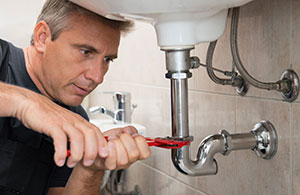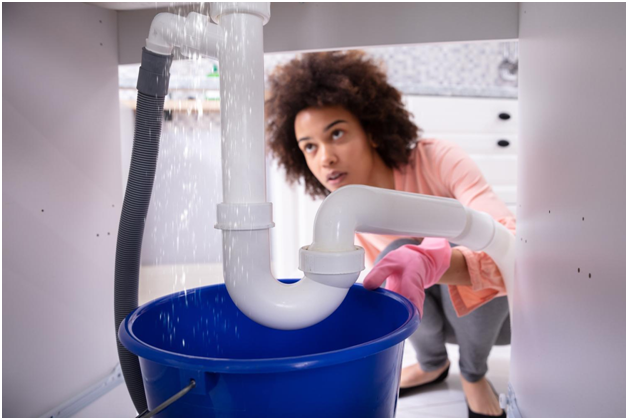They are making a few good observations on the subject of Plumbing Emergencies: Tips on What To Do Before as a whole in this post underneath.

Pipes emergency situations can strike at any moment, triggering tension and potential damages to your home. Whether it's a ruptured pipe, a blocked drain, or a dripping tap, understanding how to take care of the circumstance up until a professional plumbing technician shows up can save you from further complications. This article gives crucial emergency situation plumbing suggestions to help you mitigate damages and restore control throughout a pipes crisis.
Switch off the Water System
The initial step in any pipes emergency situation is to turn off the water supply. For local problems, such as a leaking tap or toilet, switch off the valve near the component. When it comes to a major leakage or burst pipeline, locate your home's major water shut-off valve and transform it off right away. Knowing the area of these valves ahead of time can save beneficial time during an emergency situation.
Turn off Your Hot Water Heater
In certain emergencies, such as a ruptured pipeline, it's smart to shut down your water heater. This protects against overheating or damages to the unit when water quits flowing. Shut off the power supply to the hot water heater (electric or gas) and allow it cool down to stay clear of prospective threats.
Briefly Stop a Ruptured Pipe
A ruptured pipe can result in substantial water damage in mins. To reduce the issue:
Call an expert plumber promptly to address the issue completely.
Have an Emergency Pipes Kit
Prepare a fundamental pipes emergency set to take care of minor problems properly. Your kit must consist of:
Having these tools accessible can make a considerable difference in your capability to take care of emergencies.
Unclog Drains Pipes Safely.
A stopped up drain can be a discouraging and unpleasant problem. Below's how to tackle it:.
If these methods don't work, prevent utilizing extreme pressure, as it might aggravate the obstruction.
Handle Overflowing Toilets.
An overruning bathroom can trigger immediate chaos. Here's what you should do:.
Address Small Leakages with Momentary Repairs.
Small leakages can swiftly end up being substantial troubles if left unattended. Use these short-lived repairs until specialist assistance shows up:.
While these repairs aren't permanent, they can assist minimize water loss and damages.
Deal With Frozen Piping Carefully.
In chillier climates, icy pipes are an usual emergency. If you think an icy pipeline:.
Know When to Call a Professional.
While quick fixes can aid temporarily, particular plumbing concerns call for instant specialist interest. Call a plumber if:.
Immediately contacting an expert ensures the problem is settled properly and protects against further issues.
Prevent Additional Damages.
Taking quick action to lessen damage can conserve you time and money over time. Below's how:.
Verdict.
Plumbing emergencies can be overwhelming, however with the appropriate knowledge and tools, you can handle the circumstance properly until assistance gets here. By turning off the water system, resolving small leaks, and using momentary solutions, you can minimize damage and maintain your home safe. Bear in mind, these tips are momentary services; constantly consult a certified plumbing professional to deal with the source of the trouble. Preparation and quick reasoning are your best allies in any type of pipes emergency situation.
8 Helpful Tips for Managing Plumbing Emergencies at Home
If your plumbing system hasn’t failed once, wait for it because almost everyone has a story to tell. Sometimes, it could be simple emergencies such as a leaking pipe, a blocked cistern, or even a big burst pipe. In situations like this, you need to have some handy tips to save you some money and from possible damages.
Take care of minor issues early.
Sometimes, you could have avoided an emergency by taking proactive measures while it was still early. Some major plumbing emergencies can be a result of an ignored minor issue. We recommend that you have items like plumbing tapes and other related items. A plumbing tape can allow you to manage minor leaks before the plumber arrives.
Cut off the water supply.
This tip is essential in almost any type of leakage problem. For problems like minor leakages in the toilet or kitchen, turn off the supply that takes water to the affected pipes. If the leakage is a major pipe, you must shut off the supply valve to the entire building. This will help you avoid flooding your home and neighbors if you share a flat.
Know your plumbing system
Folks typically move into a new apartment without understanding the water supply around the building. This can prove disastrous if a water emergency arises and the plumber is far away. The previous tip will prove useless if you don’t practice this one. More importantly, know where your water shut-off valve is located – you’ll need that knowledge to prevent potential home floods.
Have some common handy tools
There are lots of plumbing emergencies that you can handle without hiring a plumber. That’s why you must keep some tools available always. Some tools that you can use to fix simple plumbing emergencies easily include plumbing tapes, screwdrivers, thread seal tapes, plungers, pliers, tape measures, and rubber gloves.
Insulate your pipes from cold
You’ll save yourself from many plumbing expenses if you protect your water pipes from the cold. This is because of the harmful effects that cold weather can have on your pipes. During winter, your pipes can burst from being overly expected to freezing temperatures. So, make sure insulators are there to keep the pipes working correctly.
Avoid practices that will clog your toilet.
Many people indulge in practices that can damage the plumbing system of the entire building. One of these is when they use their toilet to dispose-off garbage. They flush all kinds of things, such as paper towels, bandages, hairs, female sanitary products, etc., down the toilet. This will block your toilet in the long run, incurring unnecessary expenditures. Dump such waste in the trash instead.
Check your dials regularly.
Sometimes, there could be leakages in your home without noticing them in time. So, constantly monitor your water meter dial. If the dial is reading when there is nobody using water, this is an indicator that there is leaking. Check for leaks immediately. Call a plumber as soon as possible if you can’t find any.
https://www.constructionplacements.com/8-helpful-tips-for-managing-plumbing-emergencies-at-home/

We had been made aware of that report about What to Do During a Plumbing Emergency through someone on another domain. Liked our content? Please share it. Let someone else check it out. We truly appreciate your readership.
Visit My Web Page